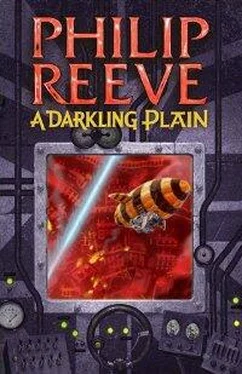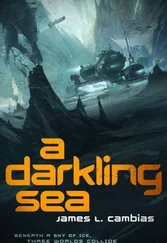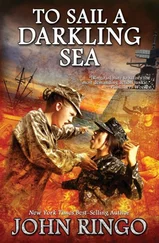He strode across the grass to an observation balcony. Standing against the railings, he breathed in deeply, gazing eastward toward the armored ramparts of his own city, and then east again, to no-man’s-land. It was three weeks since Wolf had left Murnau. What was he doing now? Where was that nasty suburb of his? What would become of it if the war began again?
“Von Kobold?” asked someone close behind him. “Kriegsmarschall von Kobold?”
He turned and saw an impertinent, overdressed stranger with ginger whiskers. The young man looked slightly demented. Kobold almost regretted that he had left his staff officers behind in the council hall. But he was not going to let himself be scared by a ferrety little scrub like this, so he drew himself to attention and said, “I am von Kobold.”
“Varley.” The stranger held out a hand, and he could think of no good excuse not to shake it. “Napster Varley,” said the man, beaming at him. A gold tooth blinked like a heliograph. “I popped down here, hoping to speak to your little conference, but they wouldn’t let me in. So I was hanging about, waiting for it all to finish so I could buttonhole one of you on your way back to your airships, and I noticed you wandering about. Stroke of luck, isn’t it?”
“Is it?”
“Oh, it is indeed, Herr Kobold!” (Hair Kobold; his pronunciation made the kriegsmarschall wince.) “You see, sir, I’m in the air trade. A dealer in curiosities. And curious is the word for the little item I’ve got aboard my ship, sir, just waiting for the right buyer. So when I saw you, sir, walking through the park here, all alone, like, I said to myself, ‘Napster,’ I said, ‘the Gods of Trade have sent him here so you can go and tell him what a bargain is waiting for him, up at Airhaven.’”
“Airhaven?” said von Kobold, and glanced to leeward, where the flying town was drifting above a haze of city smoke a few miles away. Nobody was going to lure him to a place like that! A free port, probably a nest of Mossie spies and assassins. He stepped away from Varley and started walking back toward the town hall, calling over his shoulder, “Whatever you’re selling, Mr. Varley, I am not interested.”
“Oh, yes, you are, sir!” said the merchant, hurrying to catch him up. “Least, you will be when you find out what it is. Could be important, sir. For the war effort, like. I’m only trying to do my bit, sir.”
Von Kobold stopped, wondering what on Earth the man was talking about. Shady scavengers were always emerging from the Out-Country with bits of Old Tech that they claimed would end the war. Most of them were charlatans, but you could never be sure… “If you think it might be important,” he said, “you should take it to the authorities. Either here in Manchester or in Murnau. They’ll know what to do with it.”
“Ah, but I don’t suppose they’ll reward me for my troubles, will they, sir? And I’ve taken considerable trouble to acquire this item, so I shall want a considerable reward.”
“But if you are a good Municipal Darwinist and you think this thing can help us—”
“I’m what you might call a Municipal Darwinist second, sir,” said Varley, “and a businessman first.” He shrugged, and muttered, somewhat perplexingly, “Scatter cushions! Grandma had the right idea! I never thought it’d be so hard to find a buyer…”
Von Kobold turned away again, but before he could walk on, the merchant’s hand closed on his sleeve. “Look, sir!” he said. He was holding out some sort of photograph. Von Kobold, who was too proud to wear his reading glasses in public, could not make it out. He pushed Varley away, but the merchant stuffed the photograph into the breast pocket of his tunic and said ingratiatingly, “I expect you’ll want to come and arrange a price, sir. You’ll find my ship on Strut 13, Airhaven Main Ring. Varley’s the name, sir. And the reserve price is ten thousand shineys…”
“Well, of all the infernal—” von Kobold started to say, but he was interrupted by the voice of his aide, Captain Eschenbach. The young man was hurrying down the steps of the town hall, and Varley, seeing him, ducked between some nearby bushes and went scurrying away.
“Was that fellow bothering you, Kriegsmarschall?” asked Eschenbach, drawing level with von Kobold.
“No. A crackpot; nothing.”
“You should come inside, sir,” the young man said. “They are discussing battle plans. Deciding which city attacks which sector of the enemy’s territory. Browne has bagged the static fortress called Forward Command for Manchester; Dortmund is to take everything on the east shore of the Sea of Khazak. There’ll be nothing left for us, sir, if you’re not quick. We don’t want to lose out…”
“Lose out?” Von Kobold narrowed his eyes, scanning the park for Varley. There was no sign of him, unless he was aboard that balloon taxi lifting off from a platform at the tier’s edge. “Is this what it has all been for?” he asked. “Just so men like Adlai Browne can turn the Storm’s lands into one enormous all-you-can-eat buffet? Why can’t we let them live in peace?”
Eschenbach frowned, trying hard to understand but not quite managing it. “But they’re Mossies, sir.”
Von Kobold started to walk toward the town hall. “Poor Naga,” he said. He climbed the stairs and went inside to fight for his city’s corner, forgetting all about the photograph that Napster Varley had pushed into his pocket.
Chapter 25
Theo in Airhaven
By late afternoon the sky around Airhaven was humming with traffic. Everyone knew that Adlai Browne had brought Manchester east for the sole purpose of getting the war started again, and the air traders were eager to do as much business as possible before they took off for safer markets farther west. To and fro between the cities and the flying town went the freighters and the overladen balloons, while high above them, ever watchful, the Flying Ferrets wheeled like flocks of starlings. But Orla Twombley’s airmen were on the lookout for Green Storm attack ships, and they paid no attention to a greasy little Achebe 100 that came puttering out of the west that evening to slip into a cheap berth on Airhaven’s docking ring.
She was called the Shadow Aspect, and she had been captured from the old League long ago and converted into a merchantman. She was not much, but she was the best that Hester had been able to afford after selling her sand ship. All the way from Africa Hester had grumbled about her leaky cells and racketing engines, and cursed the used-airship dealer who had sold her such a death trap. But Theo, who had been doing most of the flying, had grown used to the Shadow’s little ways; he secretly thought she was a fine old ship, and in the quiet of the night watches he had whispered kindly to her, urging her on her way, “Go on; just a little longer; you can make it…”
And now she had made it; the long voyage was over, and the sight of all those cities arranged on the earth below him like monstrous chess pieces filled Theo with anger and fear. Cities were his enemies. They had been the enemies of his people for a thousand years. What was he thinking of, coming into the heart of this vast cluster of them? He had no hope of rescuing Lady Naga from whatever prison the townies had penned her in. She would not have expected him to try; she would not want anyone to die for her sake…
The Shadow’s docking clamps clanged against the strut. Theo cut her engines, and the sounds of Airhaven spilled into the gondola: shouts of merchants and stevedores, rattling chains, a hurdy-gurdy playing somewhere, a trader maneuvering at the next strut. A boy with a bucket and a long-handled squeegee came running to clean the Shadow’s windows, but Hester waved him away, and a glimpse of her angry, hideous face was enough to send him scuttling off.
Читать дальше












